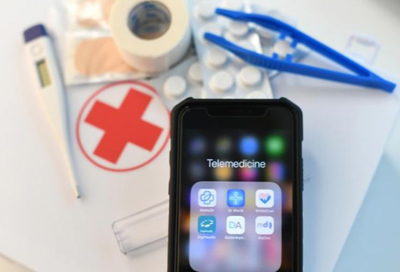SINGAPORE - Following the success of the Covid-19 virtual wards programme, where patients who would otherwise be ineligible for home recovery were telemonitored and allowed to safely recover at home, the Ministry of Health (MOH) is looking at a similar set-up for other medical conditions.
The Covid-19 virtual wards at National University Hospital (NUH), Singapore General Hospital (SGH) and Khoo Teck Puat Hospital (KTPH) have helped more than 700 patients and saved hospitals more than 5,000 bed days.
Patients under the programme are prompted via chatbots or phone calls to check their vital signs - such as oxygen saturation and temperature - regularly.
A similar initiative under the MOH Office for Healthcare Transformation (MOHT) called MIC@Home will be launched in the first half of this year for patients with other medical conditions and for those who require post-operative care.
These conditions include diabetes and hypertension, pneumonia, urinary tract infection and chronic infections such as septicaemia, where bacteria enter the bloodstream and cause blood poisoning.
These patients are otherwise stable but need to be hospitalised to manage their medical conditions until they are fit for discharge, said MOH on Wednesday (March 9).
Mr Lai Yi Feng, the project manager for MIC@Home, told The Straits Times on Wednesday that three pilots will be rolled out, at NUH and Alexandra Hospital (NUHS@Home), SGH (SGH@Home) and KTPH (YH Medical Home)
The project will involve 2,000 patients over a period of two years and recruitment will begin in the first half of the year.
Patients must be 21 or older, and must have adequate caregiving support at home if they are not able to take care of themselves, said Mr Lai.
"If the patient is staying alone, they need to be independent, safe and able to take medications reliably. Suitable patients and their families are counselled by hospital teams to introduce the intent and logistics of the programme before commencing," he added.
MOH will then review the programme results before scaling it up to a mainstream medical service model to complement inpatient hospital care for suitable patients.
Mobile care teams in the pilot phase will deliver selected inpatient-level services to the patient's homes, including teleconsultation, remote vital signs monitoring, regular visits by doctors, nurses and therapists, as well as intravenous therapy and simple blood tests, said MOH.
 Patients under the programme are prompted via chat bots or phone calls to check their vital signs regularly.
Patients under the programme are prompted via chat bots or phone calls to check their vital signs regularly.
ST PHOTO ILLUSTRATION: DESMOND FOO
Mr Lai said that, while these services and consumables will count towards the inpatient bill, the total cost borne by the patient - after taking into account subsidies - should be equivalent to that of a regular hospital stay.
He added that Covid-19 virtual wards have demonstrated the need for "elastic virtual bed capacity" - extra "beds" to tap when needed - especially in meeting surges in hospital care needs.
Such an initiative can also help Singapore prepare for the next pandemic, as some conditions which would require hospitalisation could instead be treated from home.
"In addition, with aspirations for seniors to age in place (when a person lives and ages in their residence of choice for as long as they can), and for care to be shifted beyond the hospital to the community, such initiatives can create an alternative and sustainable path to tackle the challenges associated with an ageing population and growing demand for hospital care," said Mr Lai.
Asked about whether there are plans to ensure that seniors or those who are less tech-savvy can use these telemedicine
solutions, Mr Lai said that MOHT is working with multiple technological providers to make sure that is the case.
"We are collaborating with tele- and mobile medicine service providers such as Speedoc to augment healthcare manpower on the ground and reduce each pilots' reliance on limited hospital resources," he added.
